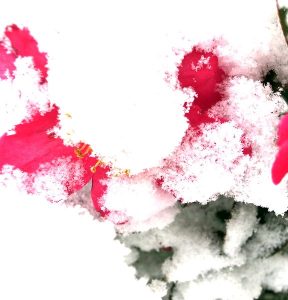This is the 15th story in a series. Click here to read all parts from the beginning.
Maybe some people’s lives would have flashed before their eyes when a hungry wild beast leaped toward them, but that wasn’t what happened with me. Instead, it felt like a car wreck I had seen a few years ago, when I’d stopped my Chevy truck behind a line of cars at a red light on a divided four-lane road in Knoxville and some crazy guy came barreling around a curve toward me, going twice the speed limit. He was either going to hit my truck or the car in the lane beside me—there wasn’t time for anything else to happen—and all I could do for that fraction of a second was just sit there hoping it wouldn’t be me.
As it turned out, it wasn’t me, and I got lucky again with the warhagalla. The beast came close enough that I could see every detail of its open jaws and huge fangs before it chomped down on the flying rodent right next to me. Blood spattered all over the snow, barely missing my white fur coat. The warhagalla sat down almost within arm’s length of me, happily gnawing on its prey as its big brown tail thumped the frozen ground, just like a dog with a biscuit.
I edged away a few steps before dropping the shovel and pulling the knife from my belt instead. “Enjoy your breakfast, Rover,” I said under my breath, as I backed away into the trees. Looking to my left, I thought I saw more drops of blood, but I soon realized I was mistaken. A tiny patch of red flowers had started coming into bloom under one of the evergreens.
(Creative Commons image via flickr)
By the time I got back to the cabin, Ira was busy stoking the fire. He stood up as I hurried inside, still tightly clutching the knife, and dropped the heavy wooden bar across the door.
“A warhagalla in the trees.” Rather than putting the knife back in the box where I’d found it, I set it down on a shelf near my coat for easier access. “Looks like the beast didn’t get the memo about staying away from the cursed mountains.”
“They range widely. Most often they’re in other places.”
Ira didn’t seem too concerned as he tossed another log on the fire and poked at it, watching the flames rise. I walked toward him, thinking I should offer to help with other chores. After two days here, without slaying dragons or doing much else, I’d started to feel that I wasn’t earning my keep. I had been chosen to travel through the sorcerers’ portal, or so the Romanian woman had said; but I still had no clue why.
Then it occurred to me that my host might be able to tell me a little more about it, even though he wasn’t really a sorcerer.
“Just before I was taken through the magic portal,” I told Ira, “someone came up to me and said I’d been chosen because I was neither female nor male, drawing upon all the powers of the earth and sky. Do you have any idea what that might have meant?”
Apparently satisfied with the fire’s progress, Ira took a step away from it. “Dragons are of the sky, and people are of the earth,” he observed, stretching his long-limbed body and cracking his big knuckles.
Okay, that part wasn’t too hard, even for a caveman. “And powers?”
“We have few powers since the sorcerers left us. Probably there are other spellbooks besides the one here, but most of my people wouldn’t be able to read them. As for dragons, if they have any powers other than flight and breathing fire, I don’t know what those might be.”
Nothing came to my mind either. During the years I’d been working in the dragon-control business, no dragons had ever used magical powers to escape my nets.
After a minute or two passed, I was starting to think that Ira had nothing more to say. Then he added, in a distinctly sour tone, “There are some among my people who claim they are neither female nor male. That is another reason why we diminish.”
Well, dang—I hadn’t seen that coming. Yeah, I’d heard worse in Tennessee, but I hadn’t expected to get it from a furry giant on an alien planet.
“Whatever,” I said just as sourly, turning away as if to look out the window. Not that there was anything to see; yesterday’s thick layer of ice still covered the glass, although it looked like it was melting a bit.
I heard logs shifting and sparks popping as Ira poked the fire again, though it didn’t seem to need it. The cabin was warming up fairly well.
“If I had children, I would teach them to read,” Ira finally said, his tone softening. “I’d like to be a father, and I think I could be a good one. But I haven’t found a woman who wants to have children—most don’t, these days. I sometimes feel I can’t blame them. It’s true what they say, that this isn’t much of a world to bring a child into—but if we don’t even try, then how can anything get better?”
A loud crash like glass shattering came from outside the window, but the ice-encrusted pane was still in one piece. A big icicle, I supposed, falling from the roof and breaking on the hard ground. Another of this place’s many hazards.
I stepped away from the window, turning to face my companion again.
“I don’t know, Ira. Where I come from, some people say that we have to find our purpose in life, but I’ve never been convinced of that. For me, it feels like there are many small purposes to be found in each moment, and all I can do is sort through them as best I can.”

